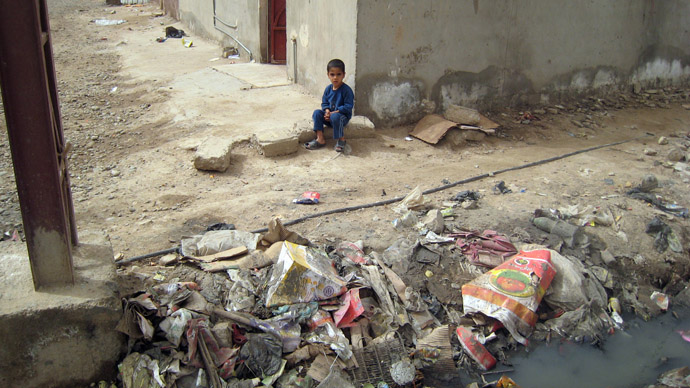Besides the constant threat of violent death, shortages of electricity and clean water continue to make life unnecessarily difficult for many Iraqis. The following eyewitness report shows all too clearly what has become of Iraq in the aftermath of invasion and occupation:
"On the backdrop of this, most Iraqis remain impoverished, struggling to make their ends meet. In the Al Tajiat landfill, on the outskirts of Baghdad, people are actually forced to live – without any proper living conditions: 'There are no schools for the kids here, no electricity, no real houses. To get a drink of water we have to travel 4km. It’s very difficult to live here.' ”
"Despite Iraq being rich in natural resources and the US pouring money into its economy for over a decade, Iraqi infrastructure is constantly failing and the people are forced to beg . . .
"In spite of billions of dollars spent on reconstruction following the decade-long conflict, many neighborhoods lack sewerage systems and trash collection services. In some settlements, there are barely any streets. Water is also a big problem, locals pointed out: 'Nobody drinks the city water because we know it’s not clean. Since the war, I’ve had to rely on bottled water. What comes out of the tap is contaminated and makes us sick. How can we drink it?'
"Central power is another issue, with the system sometimes on for as little as two hours a day. Electrician from Baghdad Abu Meria is sure the new government is to blame for the chaos that reigning in his homeland: 'It's the citizens who suffer in the end, not the government. The services are so bad and the power system has really deteriorated. There were billions spent on fixing the grid but there’s little to show for it.'
"In spite of billions of dollars spent on reconstruction following the decade-long conflict, many neighborhoods lack sewerage systems and trash collection services. In some settlements, there are barely any streets. Water is also a big problem, locals pointed out: 'Nobody drinks the city water because we know it’s not clean. Since the war, I’ve had to rely on bottled water. What comes out of the tap is contaminated and makes us sick. How can we drink it?'
"Central power is another issue, with the system sometimes on for as little as two hours a day. Electrician from Baghdad Abu Meria is sure the new government is to blame for the chaos that reigning in his homeland: 'It's the citizens who suffer in the end, not the government. The services are so bad and the power system has really deteriorated. There were billions spent on fixing the grid but there’s little to show for it.'
